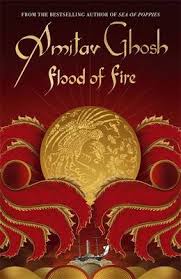Flood of Fire
Amitav Ghosh

Paperback: 624 pages Publisher: John Murray (May 2015) Language: English« Book Excerpts »US: Amazon, Barnes & NobleUK: Cole’s Books, Amazon.co.ukIN: Flipkart, Amazon.inPK: |
Flood of Fire is the gigantic third novel in Amitav Ghosh’s extraordinary Ibis trilogy, a story of the Opium Wars told from the perspective of Indian and western participants, with a glance to the Chinese side, too. The first novel, Sea of Poppies (2008), describes opium production in India, and is mostly set on a former slaving ship, the Ibis. The second, River of Smoke (2011), follows an opium ship, the Anahita, to Canton. With Ghosh’s new book, the perfidy and brutality of British “free trade” comes into sharp focus. Ghosh’s characters convene in ways that unpick how and why the British went to war with China after the Emperor banned them from importing opium into his country. The Ibis, Anahita and other Indian and British ships assemble on the Chinese seaboard, poised like birds of prey, waiting for the kill. There was no moral justification for the Opium Wars, and Ghosh arrays various characters to illustrate this point. Zachary, the young American hero of Sea of Poppies, succumbs to the temptations of lucre, corrupted by British example into becoming an opium trader. Ah Fatt, another traveller from the first book, becomes addicted to opium in China. But the ignominy, of course, is mostly retrospective. At the time, the British saw the military force they were assembling as a valiant strike against tyranny, as Ghosh’s pompous, moralising creation, the British trader Mr Burnham, puts it on the eve of battle: “On shoulders such as these will fall the task of . . . bestowing on the people of China the gift of liberty that the British Empire has already conferred on all those parts of the globe that it has conquered and subjugated.” The force that is assembled to bombard the Chinese is drawn from the East India Company Army, and two new characters, Captain Mee (British) and Kesri Singh (Indian), are the pegs on which Ghosh’s compelling portrait of the army hangs. Captain Mee plays the role of a marginally more sympathetic Brit. Kesri Singh sweats blood as a case-study in subaltern reactions to British rule. There are many unforgettable vignettes, such as Kesri Singh learning about his new uniform: “The recruits took it in turn to try the topee and afterwards they fell silent: its weight conveyed to them more graphically than anything they had yet heard, how different the future would be from the life they had known before.” Ghosh’s scrupulous depiction of army life is just one part of this tour de force of historical description. Together, the novels are a weighty and precious chronicle of those times, a compendium of lost habits, languages and attitudes. Each of the books in the trilogy is longer than the last, and the list of sources (mostly 19th-century British chroniclers) runs to several dense pages. If writing the trilogy involved years and years of reading and note-taking, Ghosh’s characters compensate for the sedentary labour of their creator by never sitting still for a minute. There is far too much history in the offing (to borrow a nautical term) to waste time on reflection and regret. Flood of Fire is all action. There are dangerous sea journeys, perilous trysts and strategic deaths. Vast fortunes are gained, intimate confidences betrayed. Ghosh hints that Flood of Fire may not, after all, be the end of the story, and you can see why. The books have been successful with both readers and critics; the first two volumes won several prizes and sold many copies, and no doubt did much to get their author shortlisted for the Man Booker International Prize, the winner of which will be announced next week. One reason for the trilogy’s popularity may be that despite being a study of British imperialism, there is a counter-current of ebullience that feels like the product of the author’s times, rather than that of his subjects. Ghosh allows his Indian characters to be agents of their own destinies, and most escape the clutches of colonialism in the end. Until the Ibis trilogy began, Ghosh used English plainly and without reverence in his novels, as if to emphasise the postcolonial point that it is just one language among many (he speaks five). In the Ibis trilogy, however, it is far richer, drawing colour and quiddity from words that bleed in from elsewhere. His British characters speak an amazing khichri of Indian-English. Some words still exist in British English (such as the Hindi word khichri, which has become “kedgeree”) but others are forgotten, as this lady’s sexual guidance to her lover reminds us: “I do not doubt that it is a joy to be a launder of your age, with a lathee always ready to be lagowed — and a dumbpoke is certainly a fine thing, not to be scorned. But you know, my dear mystery, a plain old-fashioned stew can always be improved by an occasional chutney.” Conversations such as these are left unglossed, and even with the help of the word-history on Ghosh’s website, readers may be none the wiser (“launder” is a sailor, “lathee” a stick, “lagow” to secure, “dumbpoke” a stew, “mystery” a craftsman — the woman is suggesting that her lover vary his sexual technique a little). The witty ventriloquism is a reminder, to British readers, that their enriched language is just one of the things they owe to India. Beyond this, Flood of Fire has all the romance, subterfuge and ingenious plotting to keep Ghosh’s audience firmly lagowed. But it is the integrity of his historical vision that will ensure his books outlast other literary dumbpokes. Alice Albinia, May 15, 2015, FTReviews |
